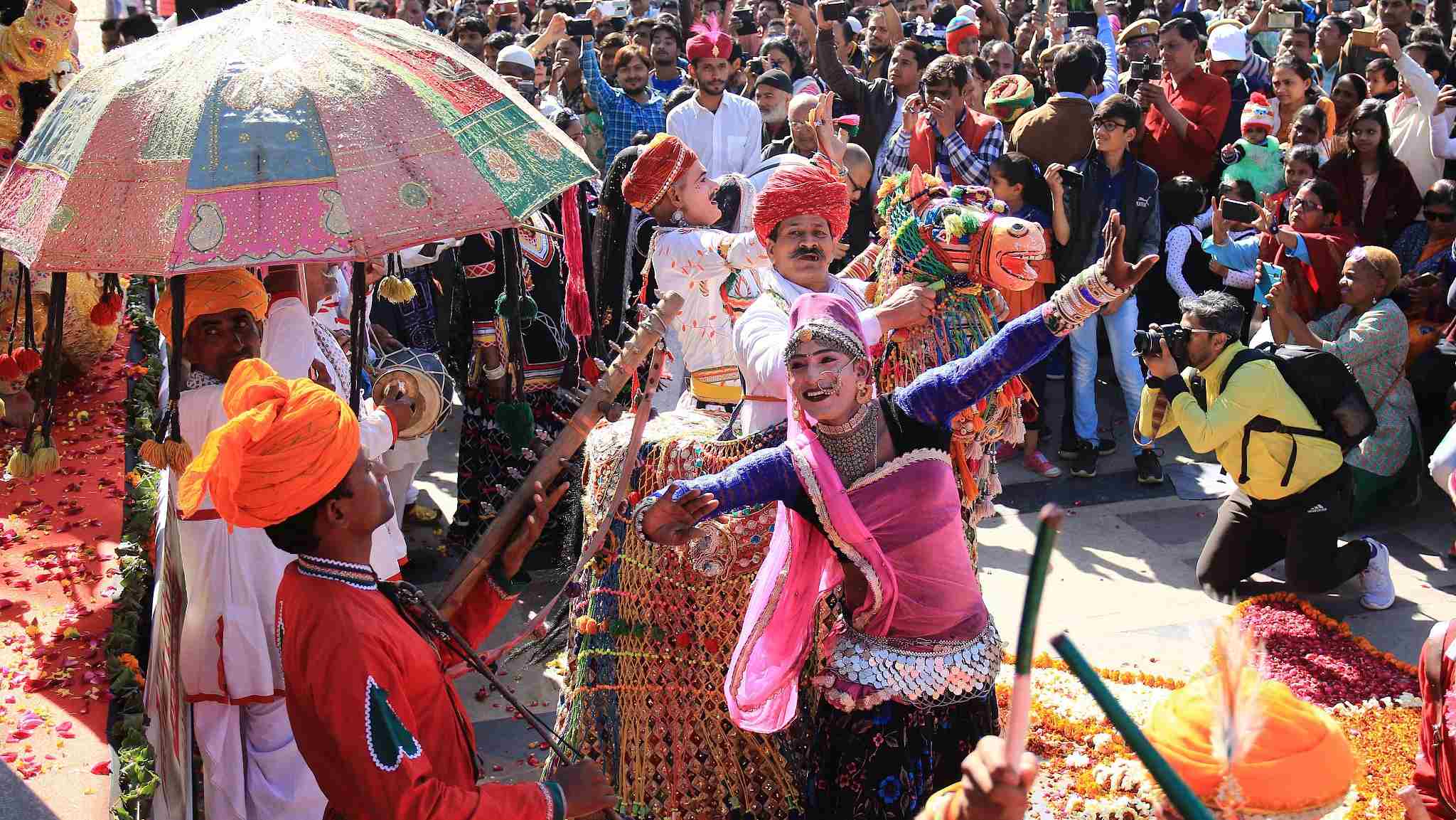

Makar Sankranti, a Hindu harvest festival, is celebrated throughout India with different traditions and customs. Telangana and Andhra Pradesh celebrate for four days, with each day having its own unique activities. In Rajasthan, traditional sweets are shared and money is poured over children. Gujarat is famous for its colourful kite flying, while in Haryana and Delhi, people take holy dips in rivers to celebrate. This festival represents the unity in diversity of India's cultural fabric.
Makar Sankranti, a harvest festival of India, is celebrated on January 14th or 15th, marking the transition of the sun's path from Sagittarius (Dhanu) to Capricorn (Makara). The festival celebrates the sun's movement northward, signifying longer and warmer days. Makar Sankranti is a major festival in Hinduism and is celebrated with various traditions and customs across the country.
Here are five frequently asked questions and answers about Makar Sankranti:
Makar Sankranti holds great cultural and religious significance in Hinduism. It marks the end of the winter solstice and the beginning of longer days, symbolizing the victory of light over darkness. It is also a time to express gratitude for a bountiful harvest and pray for prosperity and good fortune in the coming year.
The festival is celebrated with unique traditions and customs in different regions of India. In Punjab, it is known as Lohri, where people gather around bonfires, sing songs, and exchange sweets. In Rajasthan, people fly kites and engage in kite competitions. In Uttar Pradesh, a ritual bath in the holy river Ganga is performed, known as Ganga Snan.
Some of the common rituals and practices observed during Makar Sankranti include taking a holy dip in rivers or sacred water bodies, offering prayers to the Sun God, and preparing and sharing special foods. Traditional sweets and delicacies, such as til laddus, gajak, and pongal, are prepared and enjoyed during the festival.
Kite flying is an integral part of Makar Sankranti celebrations, particularly in states like Gujarat and Rajasthan. Kites of various colors and shapes fill the skies, symbolizing freedom, joy, and the breaking of old ties. The festival is also an occasion for people to come together, celebrate, and strengthen their bonds.
Makar Sankranti is also associated with the astrological shift or the sun's entry into the zodiac sign of Capricorn (Makara). It is believed that the Sun's transit into Capricorn brings positive changes and is an auspicious time to start new ventures or make important decisions.
Explore more about Makar Sankranti:

A group of foreign nationals have taken the matter of cleaning up the garbage-filled roads and drains in Gurugram into their own hands, after the city faced extensive criticism for its poor infrastructure. A viral video of them cleaning the streets has garnered widespread attention and sparked a debate on the cleanliness responsibility of locals. Along with raising awareness, these foreigners are also vocalizing the importance of keeping India clean.

Religious orator Aniruddhacharya's comments during a sermon in Vrindavan, drawing offensive comparisons between women in live-in relationships and their moral character, have triggered widespread condemnation. Social media users, public figures, and former Army officer Khushboo Patani have called out his misogynistic and regressive statements, with Uttar Pradesh Women's Commission Chairperson Babita Chauhan also denouncing his language and intent. In response to the backlash, the orator released an apology video, but critics argue that the remarks undermine efforts towards gender equality and respectful public discourse.

Stay up-to-date on the latest world news and entertainment with this innovative e-Paper that offers an Indian perspective. From cinema and streaming reviews in "First Day First Show" to top technology stories in "Today's Cache", this e-Paper covers a variety of topics. And don't miss out on "Science For All", "Data Point", "Health Matters", and "The Hindu On Books" for informative and engaging content on science, data, health, and books.

A Pakistani national was apprehended by the Border Security Force in Jammu and Kashmir's R S Pura Sector after he crossed the international border from the Pakistan side. Meanwhile, farmers and farmers' unions in flood-hit Punjab have called for support in long-term rehabilitation efforts rather than immediate supplies. Stay updated on these and other news with the Indian Express live blog.

Celebrated on September 8th, International Literacy Day is a global reminder of the power of education and literacy for individuals and communities. This year's theme, "Promoting literacy in the digital era," highlights the growing importance of digital learning and inclusivity in education. Across the world, people commemorate this day with events, drives, and creative works to raise awareness about literacy. In honor of this day, here are 20 inspirational quotes to share on social media, speeches, or posters, reminding us of the transformative power of education.

Exploring the spiritual traditions and practices associated with the upcoming lunar eclipse on September 7, 2025, in India. Learn about the Sutak Kaal, a period of spiritual pause, and the recommended dos and don'ts during this event. Discover how embracing these rituals can bring about introspection and spiritual growth during this celestial occurrence.

"September 5, 2025e-Paper" is a newly launched daily e-paper, catering to a global audience. Based in Pune, the newspaper provides a unique perspective on world affairs, cinema, technology, science, and books. With sections like "The View From India" and "The Hindu On Books", the e-paper covers a diverse range of topics and aims to provide a comprehensive reading experience to its readers.

A 20-year-old Physics student, Rishi Nair, was found dead in his hostel room at BITS Pilani Goa campus, making this the fifth such incident in less than a year. The government has formed a committee to investigate these deaths, and Chief Minister Pramod Sawant has stated that further action will be taken upon receiving the committee's report. The university has confirmed Nair's death and stated that he had been receiving clinical treatment for a personal health issue. The Opposition has criticized the BJP for failing to maintain law and order in the state after a shocking acid attack on a 17-year-old boy in Goa.

The year 2025 will witness the final lunar eclipse on September 7, an event that holds great significance not only from an astronomical perspective but also in terms of astrology and religion. With the lunar eclipse starting at 9:57 pm and ending at 1:26 am, it is essential to take note of certain rules and superstitions that must be followed to avoid any negative impact on one's life. However, it is important to keep in mind that the information presented is based on religious beliefs and folk beliefs, and there is no scientific evidence to support it. Stay informed and prepared for the lunar eclipse with India TV's guide on rules and remedies to follow.

In many parts of India, families observe Pitru Paksha - also known as Sorah Shraddha, Mahalaya, Apara Paksha, and Pitarpas - a 16-day period dedicated to honoring and remembering their ancestors. Despite its association with death rites, this spiritually powerful time is believed to bring blessings and peace to ancestors and harmony to families. The last day, Sarvapitri Amavasya, is especially significant as families offer prayers to all ancestors, regardless of their date of death.